Tubal Uriah Butler: Nelson Island Experience
Professor Winston Suite on the Nelson Island Experience
Activist Clive Nunez on the Nelson Island Experience
Maureen Searles on the Nelson Island Experience

Students from the New Butler Associate College having fun at the waterfront, Port of Spain before their trip to Nelson Island
On Monday 29th June, 2015, the water taxi terminal on Wrightson Road, Port of Spain, was filled with students from nine primary and secondary schools, eager to journey across to Nelson Island to attend the Tubal Uriah Butler: The Nelson Island Experience event. This occasion, which was hosted by the National Trust of Trinidad and Tobago in collaboration with the Ministry of National Diversity and Social Integration, commemorated Tubal Uriah ‘Buzz’ Butler’s detention on Nelson Island from 1939 to 1945. This event was opened to the general public on the 28th June, and specifically to primary, secondary and tertiary level students on this day. Present at the event included chairman of the National Trust Professor Winston Suite, Senior Academic Fellow, University of Trinidad and Tobago (UTT) Dr. Hollis Liverpool, trade unionist and activist Clive Nunez, president of the National Parent Teacher Association (NPTA) Mrs. Zena Ramatali, executive members of the National Trust Ms. Muhammed, Michelle Celestine and Valarie Taylor, adviser to the Minister of National Diversity and Social Integration Dr. Nurah-Rosalie Cordner, Butler’s grandchildren, Garnet and Maureen Searles and his great-grandchildren, Garnela and Christon Searles.
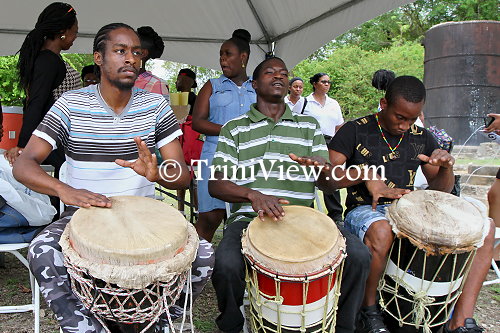
Drummers perform a ceremonial drum welcome on Nelson Island
The clear skies and calm waters had allowed for a comfortable and picturesque journey to Nelson Island. Upon arrival, the rhythmic sounds of the ceremonial drum welcome echoed throughout the small island as all disembarked from the Trini Flash water taxi and curiously headed toward the main building for the opening ceremony. The event began with the national anthem followed by brief introductory remarks from mistress of ceremonies, Valarie Taylor.
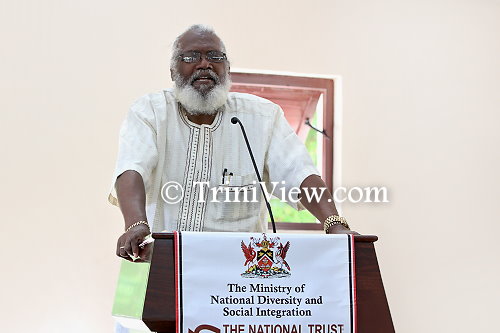
Professor Winston Suite, chairman at the National Trust of Trinidad and Tobago delivers the welcome address at the ‘Tubal Uriah Butler: Nelson Island Experience’ event
Professor Suite then welcomed the gathering and expressed that it he was pleased to see the hall full of young people. Stating that it was especially young people whom he wanted to address, he lamented the possibility that “another generation will come and go into adulthood and know little or nothing about an important part of our national heritage.” For the benefit of the audience, who, according to Suite, may have been unfamiliar with the National Trust and Nelson Island, he suggested they read some of the material that was available at the site. He also invited the older ones, in particular, to consider becoming members of the National Trust so that they could contribute to the work.
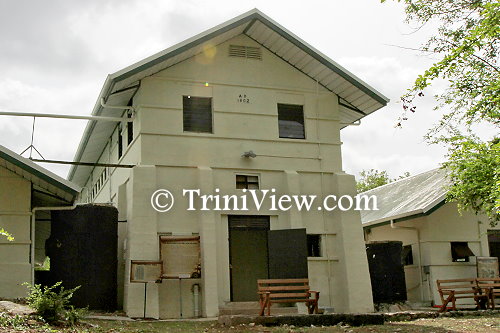
This building is dated AD 1802 and is the oldest standing roofed building in Trinidad. It was used as a registration/administration area on Nelson Island in the earlier years
Suite explained the significance of the “Tubal Uriah Butler: The Nelson Island Experience”, the history of Nelson Island and the functions of the Trinidad and Tobago National Trust:
Our work in the National [bTrust,[/b] in part, is to identify all the buildings, structures … sites in particular, whether built by man or naturally occurring, which we wish to cherish, to protect and to preserve for posterity. That’s our first task: to identify these important sites … sites of interest throughout the two islands. When we identify that, we have to list it. In other words, to register it so that the law recognizes these sites as constituting our national heritage. It’s like making an inventory; and having made the inventory, our next task is to tell everybody about the inventory. So it’s not a secret, and once you have told everybody, it’s a continual exercise. Even when we are gone, the exercise will continue and you will tell the younger ones about the national heritage.
Our next thing is, how do we preserve the National Heritage, take care of it and preserve it— maintenance, repair and protection? The next thing we do is prepare it. We package it in a way that not only Trinidadians and Tobagonians will have the opportunity to come and benefit from seeing [and] working through these phases; we will invite others from around the Caribbean, and even beyond the Caribbean. When they come here, they will see what we consider important in our history: the places, the things that are important, the things we value, the things we treasure, the things that make us different from other people, the things that constitute the body of us being a nation … what makes us a nation. That is generally what we in the Trust try to do.
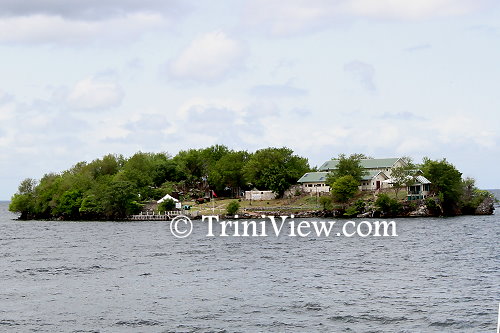
Nelson Island, which lie west of Port of Spain in the Gulf of Paria is where Tubal Uriah ‘Buzz’ Butler was detained from 1939 to 1945
He continued:
Nelson Island is one of these sites that falls under the jurisdiction of the National Trust. We are responsible for a number of these sites. Nelson Island is important in our history for several reasons. Once upon a time, all of you who are of East Indian decent and whose relatives came here after 1865, they would have passed through these set of buildings. They would have been quarantined, processed and checked. Those who were ill would have been taken to the hospital; the rest of them would have stayed in [the] building that is preserved. We were told that it is one of the oldest buildings that has endured continuous use … two hundred and thirteen years in existence of use.
Suite further commented on the historical similarity between Ellis Island and Nelson Island. According to him, all Europeans who came to the United States came through a little island called Ellis Island, “so Nelson Island is, for us, our Ellis Island.”
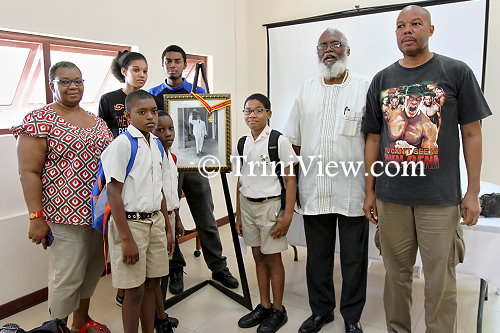
Caption: Butler’s grandchildren and great-grandchildren, Bethlehem Boys R.C. students, and Professor Winston Suite (in white)
In his final remarks, Suite underscored the island’s history and its connection to one of Trinidad and Tobago’s heroes of the colonial era:
About thirty years ago, we had a big celebration when Nelson Mandela was released after twenty-seven years in prison on Robben Island in South Africa. This island is our Robben Island because it is here that the gentleman we came here to recognize, to remember—and those who don’t know about him become aware of—Tubal Uriah ‘Buzz’ Butler was detained from 1939 to 1945, the duration of the Second World War. He was detained here because he was considered dangerous to the British Empire and the crown. He wasn’t charged; he was just detained because they considered him dangerous. The rest of Trinidad said then and say now, we don’t consider him dangerous; we consider him an icon. We consider him one of the old soldiers who fought for several things for us. That is why we are here today. That is what I want you to remember. The gentleman we came here to honour is one of our national heroes.
In 1970, Butler was honoured with the nation’s highest award, the Trinity Cross. This award was granted to nationals and non-nationals of Trinidad and Tobago who portrayed distinguished and outstanding service to Trinidad and Tobago.
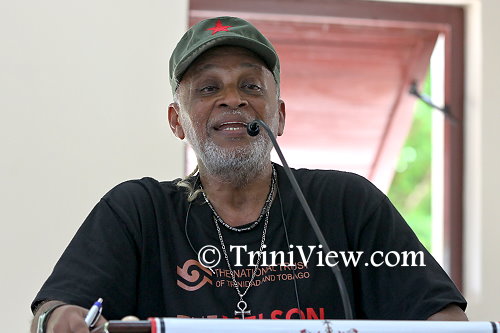
Clive Nunez, activist and trade unionist addresses the audience
Activist and trade unionist Clive Nunez was called upon next to deliver his address. According to mistress of ceremonies Valarie Taylor, Nunez is a walking piece of Trinidad history. She also shared that he is someone who has done much in terms of our national development and has devoted his life and energy to fighting the fight that Butler would have started many years ago for freedom and justice for the working classes.
According to Nunez, Butler was fiery and a great orator: “I was at his side on the 19th February, 1977, down at Strikers Village in Point Fortin, and even [though] he would have died in less than twenty-four hours, that fire … that sprit.”
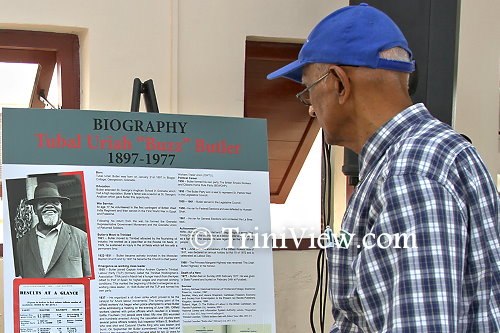
An attendee viewing Tubal Uriah ‘Buzz’ Butler’s biography in the exhibition
Butler was born in 1897 in Grenada. At the age of seventeen, he volunteered to participate in World War One which lasted between 1914 and 1918. In January, 1921, at the age of twenty-four, he left Grenada and came to Trinidad seeking employment. At the time, the oilfields were being established and so he was able to find work as a pipe fitter with the Apex Trinidad Oilfields Ltd. in Fyzabad.
During those early years under British colonial rule, there were no trade unions to defend workers from the ruthless oppression and exploitation they experienced as a consequence of racism. Prior to Butler’s arrival in Trinidad, his reputation as a labour organizer was already established in Grenada where he formed the Union of Returned Soldiers (GURS) and the Grenada Representative Government Movement (GRGM). After many years of fighting for political, economic and social reform, Butler led the workers into a series of strikes that revolutionized the labour movement in Trinidad and Tobago in the thirties.
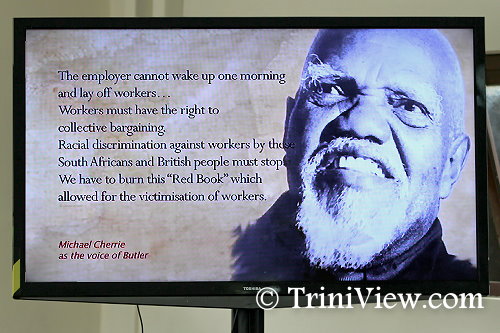
A video presentation titled ‘Prepared to Fight’
Nunez emphasized the importance of remembering the history of events that took place during the struggling years of Butler’s fight for justice. He recalled:
During the depression, there were five strikes that Butler was involved in and also hunger marches. Captain A.A. Cipriani had formed an organization called the Trinidad Workingmen’s Association (TWA) (not women [because] women scarcely got jobs). Butler joined that association and as a consequence, they had hunger marches. Captain Cipriani eventually formed the Trinidad Labour Party (TLP) and he became the Mayor of Port of Spain.
When Butler started that hunger march from Fyzabad to Port of Spain, the governor sent Captain A.A. Cipriani to move him in Chaguanas and to convince him that he must not bring the march into Port of Spain. Cipriani came with the day tidings, saying that the two hundred workers will get back their jobs and all kinds of promises. History will record, when they turned back the march they never got back their jobs and that is what caused Butler to leave the TWA and form his own union and then his own political party.
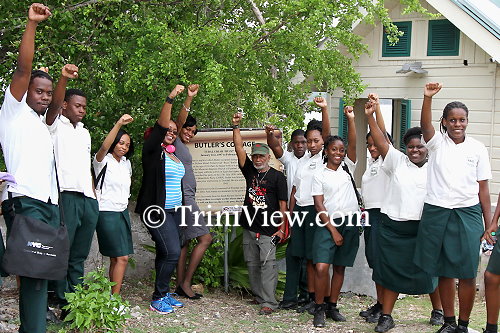
Students and teachers from the New Butler Associate College with Clive Nunez
He stressed that it is imperative that the “National Parent Teachers Association, teachers, and students to begin to agitate and demand that this history, that the history of Marcus Garvey, the history of Kwame Ture must be on the curriculum.”
He added:
What I want to tell you, is that Butler had to beg for a pension in this country. [Quoting Butler:] “As long as there is a single worker whose shack is broken down and is told you have no place in the area the fight must go on.” And you know what our history says? That Butler was arrested and charged for squatting in Strikers Village in Point Fortin and put in the Royal Jail. A man with that kind of history… but that is what they do. That is why in 1970 they had some of us here. Nine of us they had taken [to] this island, put in the Royal Jail and charged for sedition. Butler was charged for sedition, and quite recently, you had Abu Bakr. In the history of this country, eleven persons were charged for sedition. You know what is sedition? Opening the eyes of the people, pointing out to them what are the injustices and why you must fight. I will remain a fighter till my last breath against the injustices in this country.
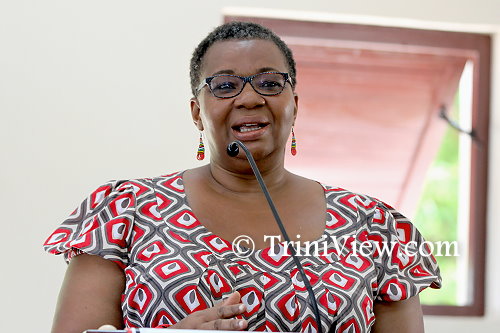
Butler’s grand daughter, Maureen Searles shares some of her most treasured moments with her grandfather
Maureen Searles, whose mother was Butler’s daughter, took to the podium next. She admitted her attendance the day before was not enough and had to come back on the second day. She explained that one of the things which stood out for her, making this occasion very important was the fact that, “for most of my mother’s life and up until very close to his death, my grandfather wasn’t seen as a national hero or an icon officially.” She lamented that hearing people talk about her grandfather at the event, she regretted that she did not have the opportunity to know him and his politics.
Searles shared her own sentiments and some of her mother’s memory of earlier times. According to Searles, when her mother was a young girl, her godmother, with whom she lived, would take her to the boat master in Port of Spain to get a pass to visit her father on Nelson Island where he was detained. She was allowed to spend a couple of days or so with him where she was free to openly roam the island, never feeling uncomfortable.
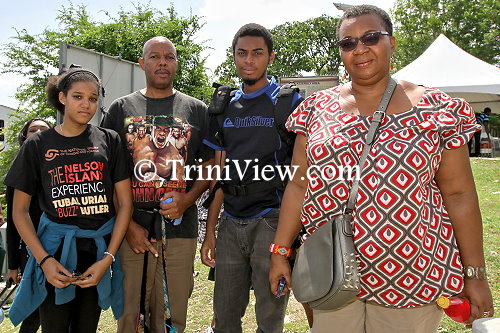
(L): Butler’s great-granddaughter Garnela Searles, grandson Garnet Searles, great-grandson Christon Searls and granddaughter Maureen Searls
She expressed that she and her family were overwhelmed hearing all the history about Butler: “To think that the day has come when they publicly acknowledge his contribution in this way then say to people openly this was a national hero … what he did was visionary.”
Although she carries the memory of her grandfather as someone who was big and tall with a strong voice, she also recalled seeing his failing health and being around him when he died. She reminisced, “When we went to visit him, it was about rubbing his feet … those feet that he walked up and down with. They didn’t do pedicures back in those days. As children, it was a mixed blessing to go visit grandpa because it meant that he would put his feet up and you would have to rub them.” She added that his philosophy was to give assistance to someone who was more in need. Her grandfather, Tubal Uriah ‘Buzz’ Butler, passed away on 20th February, 1977, at the age of eighty.
In closing, she thanked the National Trust on behalf of her family and advised the audience to use the day wisely and try to take something away from it.
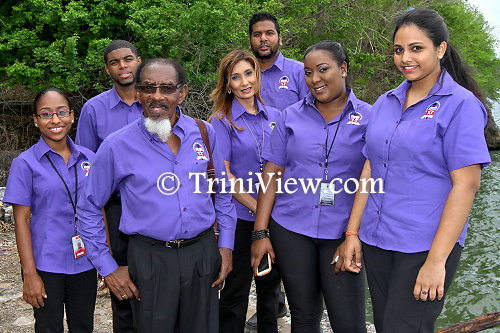
Dr. Hollis Liverpool, director of the Academy of Arts and Letters at the University of Trinidad and Tobago (UTT) and UTT representatives
Other speakers included Dr. Hollis Liverpool who presented an historical account of events that led to Butler’s arrest and detention on Nelson Island and Mr. Kaloo who shared some of his own stories and experiences about the earlier years.
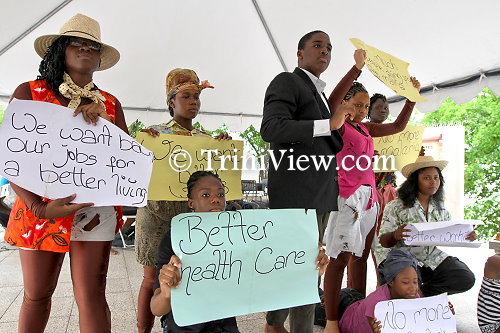
A dramatic presentation by students from the New Butler Associate College and Gonzales Workshop highlighting the labour strikes led by Butler in the 30s
The programme included guided tours around the island, a dramatization of strikes led by Butler in the thirties presented by the New Butler Associate College and Gonzales Workshop, a spoken word session with Chike Pilgrim, a calypso performance by Brother Valentino, a photographic exhibition of archival newspaper clippings and photographs, and a video presentation courtesy the National Trust and the National Archives, NALIS Heritage.
Also Read:
Professor Winston Suite on the Nelson Island Experience
Activist Clive Nunez on the Nelson Island Experience
Maureen Searles on the Nelson Island Experience
Uriah Butler – Nelson Island Experience in pictures:
www.triniview.com/gallery/main.php?g2_itemId=827189